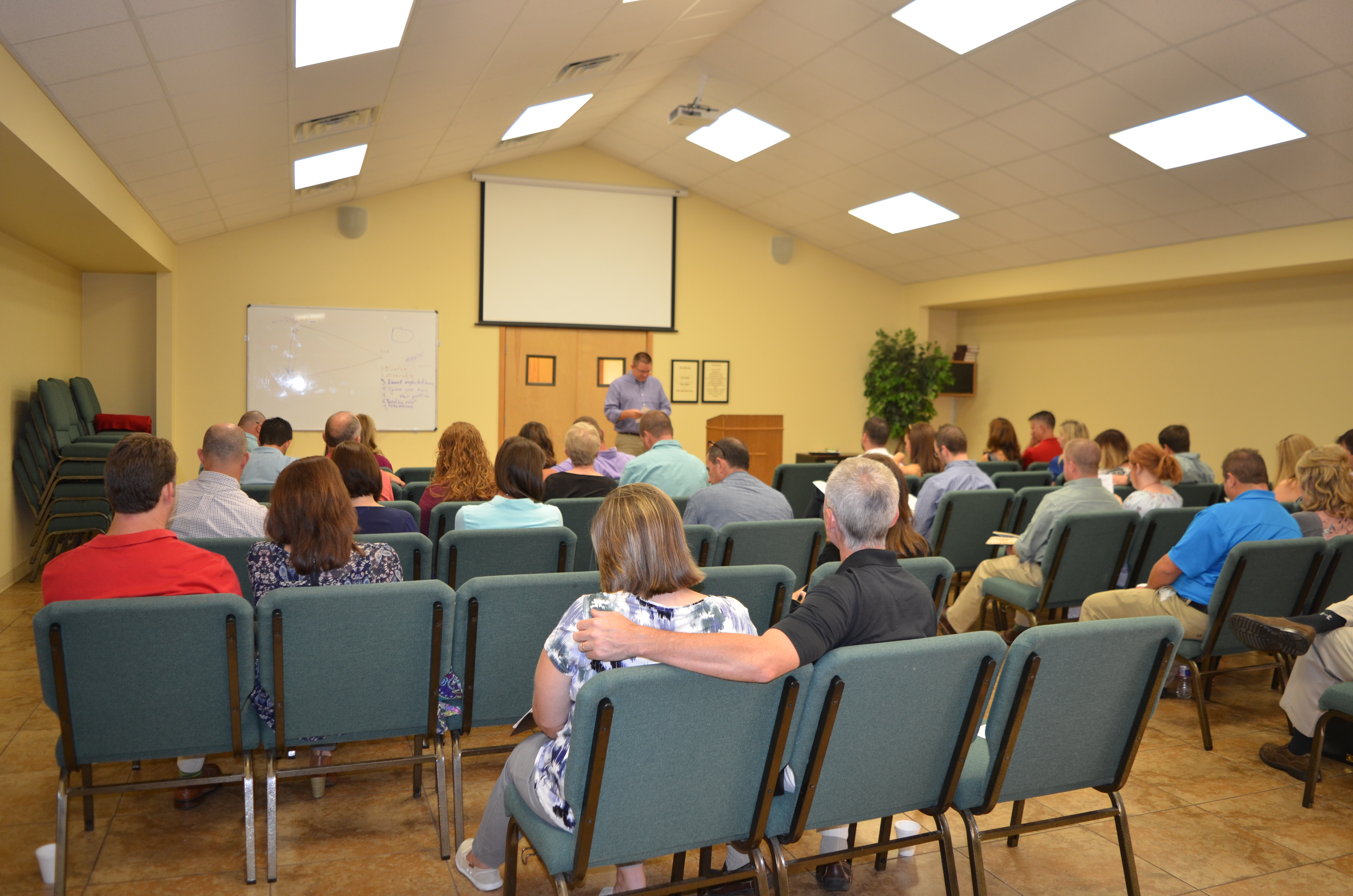Blog
Misunderstanding the Messiah
Tuesday, March 15, 2022
In this life, there are a few certainties. Water is wet, the sun rises in the east, and the mass-media articles written around Christmas and Easter about Jesus are drivel. However, during the last holiday season, I encountered one that, despite its clickbait title (“The Way We Think About the Messiah Is Very Problematic”), was semi-not-drivelly. It can be found at https://www.thedailybeast.com/the-way-we-think-about-the-messiah-is-very-problematic.
The first thing that the article gets right is its observation that the story of Jesus’ birth is a messianic one. In our society, the conflation of the birth narratives with the secular, commercial holiday of Christmas does a great deal to confuse the issue. When Lauren and I still lived in Joliet, every December we sought out a house that had in its front yard a nativity scene complete with Santa Claus gazing adoringly into the manger. In addition to being hilarious, it aptly illustrated the muddle of the American mind concerning the birth of the Lord.
The article correctly notes that the star that the magi followed was a royal, messianic symbol. Though the author doesn’t spend much time delving into the gospels, the birth accounts of both Matthew and Luke are replete with messianic language and imagery. We must understand Jesus as Messiah according to the thinking of first-century Jews and the prophecies they pondered.
From this accurate observation, though, the article goes astray. It critiques the traditional Christian belief that Jesus was more truly the Messiah (indeed, the only true Messiah) than, for instance, Simon bar Kokhba, the so-called messiah who led a Jewish revolt against the Romans from 132-136 AD. It dismisses texts like Psalm 22 and Isaiah 53 by denying that they “refer to a crucified messiah” and claiming that it “seems unfair to imply that Jewish interpreters were overlooking something”.
However, there’s a problem here. If Psalm 22 and Isaiah 53 aren’t messianic texts, what are? The obvious answer is, “prophecies that mention anointing or the Anointed One”.
Such prophecies are hard to find. Though I may be overlooking something, I can find only one clearly prophetic Old-Testament text that mentions anointing: Isaiah 61:1-2. However, when Jesus applies this prophecy to Himself during His visit to Nazareth in Luke 4:16-30, his audience apparently thinks that He’s claiming to be a prophet, not a messiah.
Other passages that mention the Anointed One and turned out to be prophetic, such as Psalms 2 and 45, are not obviously predicting future events. If I were a first-century Jew and interpreting them without the benefit of Acts 4:25-28 and Hebrews 1:8-9, I would have assumed that they referred to the historical Davidic kings. After all, the Scriptures often call Israelite kings “the Lord’s anointed”.
By contrast, the passages that the Jews did identify as messianic don’t mention anointing. The Micah 5 prophecy we’ve already examined doesn’t, but Herod’s counselors say it’s messianic anyway. After the time of Jesus, the Jews apply the prophecy of Numbers 24:17 to bar Kokhba (“bar Kokhba” means “son of the star”), and there’s nothing in it about anointing either.
In short, there’s no principled reason for Jewish interpreters to have denied that Psalm 22 and Isaiah 53 were messianic while affirming that Micah 5 and Numbers 24 were. The latter fit in with their expectations; the former didn’t. If you’re looking for a martial messiah, you’re going to reject anything about a suffering-servant messiah, even if you have reason not to.
Such reasons are particularly apparent in Isaiah 53 and its context. In Isaiah 52:13-14, the prophet predicts a servant who will be successful and exalted, yet appalling and disfigured. The first half of the prophecy sounds awfully messianic, which implies that the second half is too.
The Jews could have, and indeed should have, picked up on that, particularly when Isaiah 53 goes on to warn them that the servant will be misunderstood and rejected yet victorious. They were on notice to look for a messiah who would subvert their expectations, but they didn’t listen. Once we add “suffering” to the portfolio of the Messiah, all sorts of other passages and prophecies, from Psalms 22 and 69 to Zechariah 10-13, commend themselves to our attention. Only Jesus fulfilled all of them.
After this, though, the article does us a service by warning us against the distinction between Jesus the spiritual Messiah and the hoped-for political messiahs of the Jews. This is a temptingly easy distinction for us to make. Then, we can put Jesus in the church box—the box of a God who used to do things but doesn’t anymore—and look elsewhere for the solutions to our problems. Is it surprising, then, when Christians begin to describe contemporary political figures using language that Second Temple Jews would have called messianic?
This way of thinking fails both to reckon with the political dimensions of Jesus’ work and to give Him the place that He deserves in our lives. He wasn’t conventionally political like bar Kokhba was, but His ministry was politically significant nonetheless. When He rode into Jerusalem on a donkey, cleansed the temple, and condemned the chief priests, He was making political statements. Certainly, His enemies understood them as such; that’s why they killed Him. His early disciples did the same in confronting the Sanhedrin or refusing to sacrifice to Caesar, and they faced similarly dire consequences.
Today, we too must embrace the political implications of our hope. As He did 2000 years ago, Jesus still calls us to look for a deliverance that the world around us does not expect. We must not put our trust in princes nor think that if we elect the right group of leaders, the ills of this life will be put right. Instead, salvation will come from God and His Anointed. Christ continues to guide the course of history according to His will, and He will appear at its climactic end to vanquish evil forever and reward all those who have put their trust in Him.
Are You the Antichrist?
Monday, March 14, 2022
The title is kinda clickbaity, I admit. However, I claim 1 John 2:22 as my justification. The Holy Spirit uses the definite article, and who am I to argue grammar with the Holy Spirit?
Mention of the antichrist these days directs the minds of many religious people toward the tragedy unfolding in Ukraine. As always whenever there are wars and rumors of wars, they become convinced that the end times are upon us and start trying to map current events against the apocalyptic imagery of Biblical prophecy. Surely the ten horns of the beast are ten Russian oligarchs, and its seven heads are the seven branches of the Russian armed forces, amirite?
One of the favorite passages of these enthusiasts is one of the least favorite passages of careful Bible students, the description of the man of lawlessness in 2 Thessalonians 2. Candidly, I have no idea who the man of lawlessness is, and there is no Scriptural way to tell. However, this does not deter them from applying the passage to their least favorite world figure, which could be anybody from the pope to Vladimir Putin.
Somewhere along the way, this baleful character got mixed up with the Johannine antichrist. Nowadays, if you mention the antichrist to somebody, they probably will envision a boy with a demonic grin and eyes that glow red. He’s the capital-A Antichrist!
However, the true nature of the antichrist is much different and more straightforward. John tells us plainly in the abovementioned verse that the antichrist is anyone who denies the Father and the Son. You don’t have to be conceived at a witches’ Sabbath in the dark of night to qualify; you only have to be anti-Christ. John notes in v. 18 that there are many such people.
We can be one of them. Like the apostates of v. 19, we can reveal ourselves as antichrists by going out from the people of God. It’s tough to argue that you have not denied Christ when you have detached yourself from His body!
However, on the terms of v. 22, we can keep showing up and be the antichrist anyway. If we deny God when we aren’t assembled, the things we say for a few hours a week don’t count for much.
The number of ways we can end up in this trap is limited only by the ingenuity of the devil. Confessing that Jesus is the Christ is a consequential statement. It means that we claim Him as our Lord and maintain that He ought to be everybody else’s Lord too.
What, then, when His Lordship is not evident in our words? We downplay His control over our lives because we don’t want our worldly friends to think we’re Bible-thumpers. We tell them that they’re just fine outside His church because we don’t want to start an uncomfortable conversation. That isn’t exactly pro-Christ behavior!
So too, we become the antichrist when we deny Him with our actions. If Jesus is Lord, we must live like it. If we don’t, we reject His Lordship, and those around us will hear our denial loud and clear.
The antichrist isn’t a trope for Christian-ish horror movies or wild-eyed would-be prophets. It’s a sober warning for us. We are responsible daily for lifting up the name of God. When we do the opposite, John wants us to understand the seriousness of the step we have taken.
My Take on Bible Classes
Friday, March 11, 2022
There’s no doubt that I’m a better teacher than preacher. My first love is the lectern rather than the pulpit, and I “get” teaching Bible classes in a way that I’ve never gotten preaching sermons. Also, I’ve always been satisfied with the way my Bible classes have gone. Generally, they’re characterized by robust discussion, and interesting insights come from many participants.
However, I know that many have a much different experience teaching Bible classes than I do. Comments are hard to come by, their content is poor, and each class leaves the teacher frustrated and unfulfilled. I thought it would be worthwhile, then, to explain my approach in the hope that it might help others.
Believe in Your People
I come to every class assuming that the students collectively know more about the Bible than I do and are wiser than I am. Their biggest problem isn’t ignorance and foolishness; it’s insecurity. They are not confident in their ability to figure out the text for themselves.
I am! I believe that God’s word is for God’s people. If a group of earnest Christians can’t work its way through a passage and arrive at sound conclusions, our whole theory of religion is wrong. The narrative of the class is their journey of discovery, not my sermon masquerading as a Q&A.
Help Your People
I’ve had a lot of training in how to read and interpret texts. Most brethren haven’t. When presented with an open Bible, many of them will get a deer-in-the-headlights look. Remember: they can do this! Your job is to show them how.
The most important work of the Bible-class teacher is to guide the inquiry of the student. When you help them work through a text, they learn not only what the text means but also how to work through a text for themselves. To this end, I always teach using a workbook I’ve written, even if the class is a textual study. The workbook frames the discussion, not by offering the right answers, but by offering the right questions.
Sometimes when I’m teaching a class, the blank stares of the students tell me that I’ve asked the wrong question. Probably, I’ve skipped some analytical steps, which is a great failing of mine. Then, it’s my job to work back, to find the right question that will get their analysis of the passage started.
Trust Your People
If the teacher is doing their job right, the class should arrive at conclusions that are different and better than the teacher’s own. I enjoy teaching classes in part because I like learning from the class. If the teacher isn’t interested in learning, the class will sense this and let the guy seated in the chair of Moses do his own talking!
This means that the teacher must be willing to allow exploration in different directions and, especially, to deal respectfully with disagreement. I assume that if somebody is willing to take the relational risk of disagreeing with me in public, they probably have a point. I’ve overstated my case or missed something. In such cases, I strive to reformulate their objection better than they did as a way to locate the flaw in my own thinking. If the teacher treats the objector kindly, thoughtfully, and fairly, they generally will be satisfied with the exchange, though it never hurts to check with them after class to make sure.
Conclusion
Sad to say, many congregations have Bible classes that are boring and frustrating. This is a terrible shame and a waste of a shining opportunity. The folks in the pews can do a little bit to fix this, but mostly, it’s the role of the guy up front. When we teach with the right approach and attitude, we can build a culture of good Bible classes that show everyone what it means for us to be people of the Book.
Why Were the Disciples So Sure?
Tuesday, March 08, 2022
One of the most significant proofs of Jesus’ resurrection is the early disciples’ sincere belief that He had risen. They maintained this belief in the face of great hostility from earthly powers, enduring persecution, prison, and death rather than recanting. Whatever else they were, they were not deceivers.
However, we also must ask why they were so sure that the risen Lord had appeared to them. Many of us have had a hallucination at some point in our lives (I have), and the ancients were aware of hallucinations too. If I were standing before the Sanhedrin, I’d want to be really, really sure that my mind wasn’t playing tricks on me before I spoke up!
One of the most elegant Biblical explanations of the disciples’ certainty appears in 1 John 1:1-2. John probably wrote these words to contradict the Gnostic claim that Jesus did not come in the flesh, but they serve just as well as a defense of the resurrection. They didn’t glimpse the risen Jesus at a distance or see Him early in the morning when they were fuzzily waking up.
Instead, they heard Him. They saw Him. They studied Him intently. They touched Him with their hands. Their testimony isn’t based on wishful thinking. It’s based on the firm experience of their senses.
A study of John’s gospel reveals some of these experiences. John watched as a Roman soldier plunged His spear into Jesus’ side, and the corpse didn’t even twitch. He looked into the tomb where Jesus had been laid and saw discarded grave wrappings but no body. He heard Mary Magdalene relate that she had laid hold of the feet of the risen Jesus as she worshiped Him. He was in the locked upper room when Jesus appeared in the midst of the disciples and displayed the wounds in His hands and side for their inspection. He watched later when Thomas reached out and touched those wounds. He ate breakfast with Jesus as the sun rose over the Sea of Galilee.
To summarize, John had all the evidence he needed to be 100 percent convinced that Jesus was a real human being who really died and really was restored to life by God. So did the others. They knew this had happened.
In an earthly sense, their experience did them no favors. It set them against all the rulers of their world, men who were determined that Jesus had not risen and were indifferent to the evidence. Without the resurrection, they could have lived ordinary, peaceful lives. Because of it, they were hounded to the end of their days.
However, it also gave them the most precious hope imaginable. If Jesus was raised to life, they could trust His promise that they also would be raised to life through Him. Because of their steadfastness in testifying to their experiences, we can trust it too. Next to this, nothing else matters, either to them or to us.
Consistent Conservatism
Thursday, March 03, 2022
It should come as a surprise to no one who reads my writing that I am very conservative in my approach to religion. I put my trust in the word of God. I believe in following the first-century pattern for the church. I am deeply suspicious of human wisdom and human innovation, and if you want me to accept that the church should do something or spend its money in a certain way, you’d better have Scriptures to back that up!
I find this approach to be logically satisfying because it relies on that which can be proved, can be demonstrated, from the text. I am no less suspicious of my own judgment than I am of anyone else’s, and it protects me from following that judgment into error.
Indeed, I believe this same method is useful not only when it comes to “Bible authority” (I speak accommodatively; nothing in the life of humankind is outside the authority of the word of God) but also when it comes to matters of personal morality. There too, we ought to be circumspect, to be wary of speaking where God has not spoken, and to test every conclusion to make sure that it is founded on the Scriptures.
Interestingly, such circumspection is not what commonly is described as “conservative” among the churches of Christ. Instead, for some reason, conservatives are those who read Scriptural prohibitions on conduct very broadly and rely heavily on their own judgment in drawing conclusions. To us, the conservative is the one who measures necklines and hemlines with a ruler, condemns attending a prom as sin per se, and argues that it is sinful for Christian women to work outside the home.
I believe that such brethren hold their views in good conscience, as do those who accept church support of colleges or use the instrument in the assembly. However, sincerity is no substitute for sound Scriptural reasoning.
In order to reason soundly, we first must test all inferences. There is a vast world of difference between the inference that can be drawn and the inference that must be drawn. It is possible to infer from James 1:27 that churches are authorized to support orphans’ homes. However, the inference is not required. Indeed, the language that James uses points toward an individual rather than a congregational application.
So too, it is possible to infer from 1 Corinthians 6:19 that smoking is a sin. My body is a temple, smoking is bad for the body, so smoking is wrong. However, once again, it is not an inference that the text demands. Contextually, Paul is discussing not physical health but sexual immorality, and it is immorality that he says defiles the temple.
Second, we must be wary of citing convenient passages from the Old Testament as authority. It’s perfectly reasonable to use Proverbs 23:29-25 to argue that drinking alcohol is unwise. However, using the text to establish that drinking alcohol is sinful is problematic. Once we establish that precedent, we open the door for the argument from Psalm 150 that the use of the instrument in worship is acceptable. If indeed the old covenant was nailed to the cross with Christ, we can’t detach it from the cross whenever it makes a point we want to make.
There, of course, is where the problems arise—when we go beyond the Scriptures to reach a conclusion we want to reach. This is certainly what lies behind departures from the text in the realm of the work and worship of the church. Somebody wanted to do a “better” job of spreading the gospel, so they came up with the missionary society. Somebody else wanted song worship to sound “better”, so they added the instrument.
So too, we must beware of wanting so strongly for our brethren to make wise choices that we overlook the distinction between foolishness and sin. I think smoking is unwise, but it is not my place to force my conclusion on the Christian who smokes. I think some Christian women regularly show poor judgment in the way they dress, but I must acknowledge that the Scriptures give them the right to judge for themselves about clothing.
This does not mean that we can’t try to persuade others to our way of thinking, but “This is sin,” isn’t persuasion language. That’s coercion language, and it reveals that we have seated ourselves in the chair of Moses.
Principled, consistent conservatism is difficult. It is frustrating to look out at the world (and the church) and see so many problems we could “fix” by going beyond what is written. However, we must remember that even the foolishness of God is wiser than our wisdom. If we trust Him and hew strictly to His commandments in all things, we will find blessing in ways we had not foreseen.


